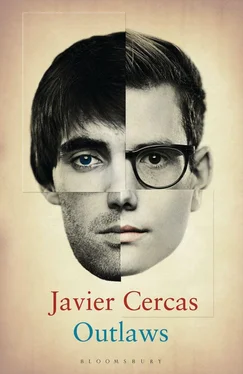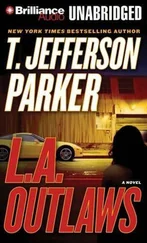‘Or I couldn’t. As soon as the programme began Gubau called me, and almost immediately after him my daughter called and then Cortés; before I got into bed I spoke by telephone with no fewer than ten people. All of them were watching the programme or had seen it and all of them wanted to comment on it and find out how I was, but from there on in the reactions differed: most of them tried to calm me down, took it for granted that the woman was crazy, that she just wanted to be on television and that what she said was false. But there were also different reactions. In my sister’s tone of voice, for example, I thought I detected, well covered by the obligatory indignation, a tiny shade of resentment, as if she were pained by the public prominence her little brother had just acquired, but also a shade of respect, as if she’d just discovered, proudly, that I had finally become somebody. Is it true that you were in his gang? my ex-wife asked for her part, with a mixture of admiration and astonishment. Crikey, you could have told me: now I understand why you were so obsessed with Zarco. . The truth is that, sometimes with one ear on the television and the other on the receiver while my mobile was ringing, I tried to deal with them all, answer their questions and play down the importance of the programme and María’s accusations, but when I finally disconnected the phones I’d realized that this was just the beginning and that, supposing it didn’t end up affecting me personally, it was obviously going to affect the opinion others had of me, which was a way of affecting me personally.
‘In the days that followed the gossip magazines and radio and television chat shows repeated María’s accusations, and that Monday morning I read in everybody’s eyes, in the office and at court, that yes, that was just the beginning. That afternoon my secretary put through an unexpected call. It was the producer of the programme María had appeared on two days before. He introduced himself, said his name — López de Sol, I remember he was called — and, without any further explanation, he offered me the possibility of defending myself the following Saturday against María’s accusations: it would simply entail allowing myself to be interviewed at the same time and on the same set by the same group of journalists that had interviewed her. I thanked him for the offer and turned it down. The producer told me not to be hasty, to think it over, that he’d phone back that evening. I answered that I’d already thought about it and he could save himself the trouble of calling back. Here the producer changed his tone, with an inflection at once friendly and paternalistic he mentioned a sum of money, not particularly high, and then explained María’s appearance on his programme the previous Saturday had been a hit, that they planned to continue with the story next Saturday and that, if I didn’t agree to be interviewed, they would most likely interview María again. Then I flew off the handle: shouting, furious, I told him he should do what he thought best, but that, if María continued talking about me on television the way she had the time before, I’d be bringing two lawsuits to court, one for slander and another for defamation of character, one against María and the other against the programme. My threat did not upset the producer; I heard him click his tongue, heard him sigh; before hanging up on him I heard him say: You haven’t understood anything, Counsellor.
‘That Saturday night María was on the show again. I decided not to watch it, and I didn’t see it, but on Sunday I learned that her second appearance had been even more brutal than the first, so for several days I considered the possibility of carrying out the threat I’d made over the phone and filing suits against María and the programme. Cortés and Gubau talked me out of it; their arguments were irrefutable: I knew it wasn’t easy to win such a lawsuit, but my partners made me see that, even supposing we did win and María was sentenced to withdrawing her insults and accusations and the programme obliged to broadcast a retraction, the person most harmed would still be me, because the trial would destroy my reputation, and the main beneficiaries would be them, because the trial would only increase María’s fame and the programme’s audience. So I chose to keep quiet, to try to stay out of it, to go on as if nothing were going on. Maybe I was mistaken. Maybe I should have filed a suit. Who knows. The thing is that over the following weeks the sensation of failure and shame multiplied and began to devour me like a cancer.’
‘Didn’t you try to talk to Tere? Didn’t you try to get in contact with her?’
‘I tried, but I couldn’t. I phoned her, but she didn’t answer. I went to her house, but she wasn’t in. Someone told me she wasn’t living in Vilarroja any more. I don’t think finding her would have done any good, anyway. Of course, it didn’t even occur to me to try to find out which prison Zarco had been sent to, although I thought of him far too often. And do you know what I remembered most of all? The night in La Creueta, of the binge he went on of telling me I was making a fool of myself and calling me dickhead and wanker. Because that was the honest truth, that’s how I felt then: like a dickhead and a wanker who’d made the most ridiculous fool of himself.
‘During the following months I again tried to force myself to forget about Tere. Also to forget about Zarco. María, however, was much harder to even try to forget, because as a result of her two appearances on the Saturday-night TV programme she blasted off for stardom and began to show up in magazines, on the radio and television much more often than she had up till then, taking Zarco’s place to a certain extent. Not that Zarco was suddenly obliterated from people’s memories, but that, thanks to María, he seemed at times to turn into a different character, hazy and secondary, into the minor bad guy of a tragedy or a melodrama no longer his own: up till then María had just been Zarco’s wife, while he was the real protagonist of the story; from then on María became the protagonist and Zarco became merely the beast who had made her a victim par excellence. As far as everything else went, that was a bad time for me. I’d just turned forty, but I felt washed up, and that feeling sunk me into a foul pit of self-pity: I saw myself wallowing about in absolute failure, in absolute drought and desiccation, in absolute futility; my old feeling of living a borrowed anodyne life returned, stronger than ever, my impression of having taken a wrong turn and of being trapped in a misunderstanding. I lost interest in my work, lost my capacity for joy, I wore out physically in no time. Some mornings I woke up crying; some nights I cried myself to sleep; some days I stayed in bed, unable to get up and go to my office. Just then I made what I thought was a great discovery; I thought I discovered a truth that I’d always had in view and hadn’t wanted to see, a truth that changed everything except the sensation of having been a dickhead and a wanker and made the most ridiculous fool of myself, which became even sharper.
‘The discovery happened in a trivial way, one morning when I was talking to a bunch of colleagues in the courthouse corridor and someone mentioned Higinio Redondo, my father’s friend, I don’t know if you remember. .’
‘The friend who lent you his house in Colera after the bank robbery in Bordils.’
‘That’s right: my mentor, the lawyer I began my career with. At a certain moment someone brought up his name while we were talking. I don’t know who it was or what they said, perhaps they were remembering one of Redondo’s anecdotes or jokes, something like that, which wasn’t unusual either, as I told you before Redondo was a real character, people at the courthouse still remember him. The thing is that Redondo’s name acted as a trigger: I suddenly stopped listening and mentally left the small group and the courthouse; suddenly, like I say, I believed I saw the truth, as if it had always been right in front of my nose, barely hidden by a semi-transparent veil, and the unexpected mention of Redondo had revealed it. I don’t remember what happened afterwards, or how the conversation ended. The only thing I remember is that for several days I walked around stunned by the humiliating certainty that my story was actually a mediocre copy of Redondo’s story, a version of a story as old and ridiculous as the world: I already told you that Redondo had fallen in love like a schoolboy with the wife of a penniless client who used him to get her husband out of prison and that, as soon as she got what she wanted, she left him.’
Читать дальше












